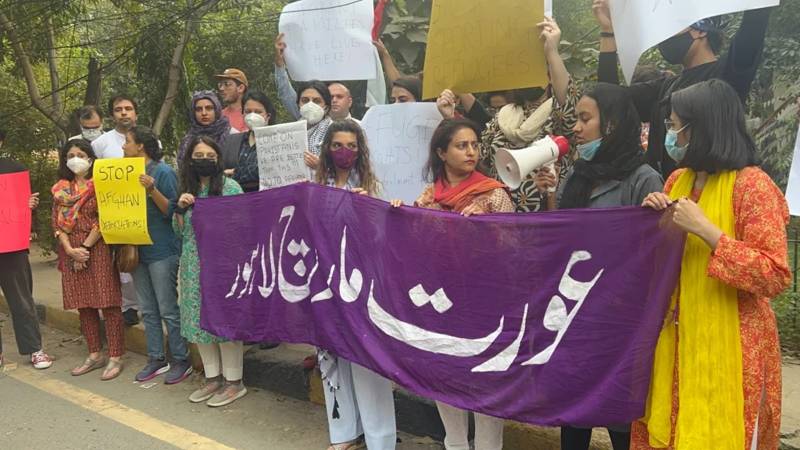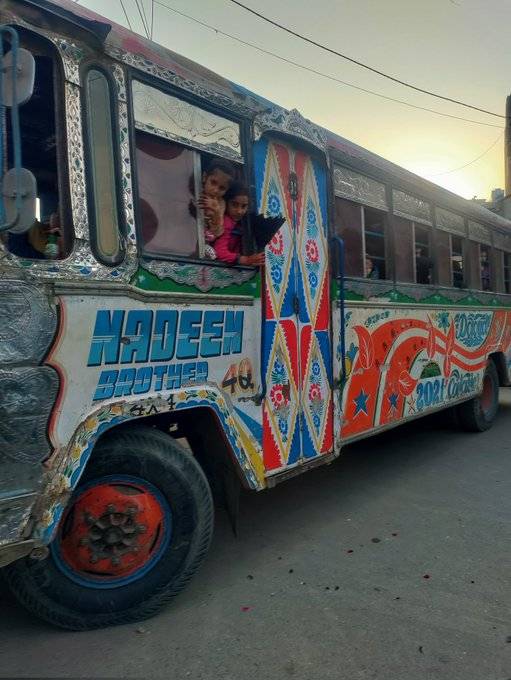
By Abdullah Zahid
In an internationally unprecedented move, Pakistan has imposed a steep $830 ‘exit permit fee’ per person on each refugee who fled the Taliban regime in Afghanistan since 2021 and is in Pakistan awaiting resettlement to another country.
Actor Angelina Jolie in a recent Instagram post earlier drew sharp attention to the plight of Afghan refugees in Pakistan after the government last month warned undocumented immigrants to leave the country or face deportation.
Pakistan has supported “many Afghan refugee families for decades,” noted Jolie, referring to the 4 million or so such refugees since the 1979 Soviet invasion.
“I am saddened they would so abruptly push back refugees who face the impossible realities of trying to survive in today’s Afghanistan, where women have again been deprived of all rights and the possibility of education, many are being imprisoned, and there is a deep humanitarian crisis,” wrote Jolie.
Pakistan has alleged that Afghans were involved in half the ‘terrorist’ attacks in Pakistan over the past year, as caretaker Interior Minister for Pakistan, Sarfraz Bugti has said. He provided no evidence for this charge.
If some refugees are involved in ‘terrorist’ activities, “then by all means prosecute and fine them as per the law,” says former member of the Planning Commission of Pakistan, Dr. Saba Gul Khattak. ”Smearing an entire community for the actions of a few ‘unknown’ bad actors is unfair and amounts to collective punishment.”
The move also ostensibly aims to combat smuggling across the porous Durand line dividing Pakistan and Afghanistan. Pakistan Army Chief Gen. Asim Munir warned that military officers involved in cross-border smuggling would be court-martialed and imprisoned.
Pakistan, like other countries in the region, is not a party to the United Nations’ 1951 Refugee Convention and its 1967 Protocol Relating to the Status of Refugees.
However, rights activists underline the moral obligation to provide humane treatment to refugees, noting that Pakistan has signed international instruments with UNHCR, and ratified the UN Convention against Torture, and the Child Rights Convention.
No reprieve
Basically the move to oust Afghan refugees is an attempt to “consolidate and centralise resources and settle the Durand line”, as the Pakistani establishment has long wanted to do, asserts political scientist and author Dr. Ayesha Siddiqa.
It has also become an extortion exercise. “Many will pay to complete the documentation,” Dr. Siddiqa told Sapan News, criticising the hastily implemented policy with its “very poor” optics.
Plus, how will the government effectively manage the exit of such a large number of refugees, she asks. And will the Taliban government accept those who’ve lived in Pakistan for generations?
“Evicting Afghans is as difficult as the Palestinian issue,” adds Dr. Siddiqa. There are “no dividends and the implementation is even more difficult”.
Perhaps this is what led a Fox News anchor in the United States to indignantly claim that Pakistan is ejecting 1.7 million Palestinians.
Fox News anchor Harris Faulkner asks "what in the world is [Tlaib] saying to the leaders of Pakistan" since they "have expelled 1.7 million Palestinians with nowhere to go."
— Justin Baragona (@justinbaragona) November 8, 2023
Pakistan has begun expelling 1.7 million Afghan refugees, not Palestinians. https://t.co/4ScnzdRYlt pic.twitter.com/FvmkO7bndi
The outraged American anchor appears ignorant about the region and its demographics, which don’t include Palestinians.
Of the four million Afghan refugees Pakistan has hosted since 1979, the government estimates 1.4 million have Proof of Registration (POR) cards, 850,000 have Afghan Citizenship Cards (ACC).
The crackdown was initially aimed at the 1.73 million refugees who lack legal documentation. However, despite earlier official assurances that legal residents would not be deported, even those with proper documentation are facing forced repatriation.
When the Taliban took over Afghanistan in August 2021, then Pakistani prime minister, Imran Khan, hailed Afghanistan’s liberation from “shackles of slavery.” His ISI chief Faiz Hameed famously sipped tea in Kabul’s Serena Hotel foyer, downplaying worries with “everything will be ok.” Later, defence Minister Khawaja Asif of the Shehbaz Sharif-led government branded the Taliban as “freedom fighters,” lauding their victory over US-led NATO’s might.
These developments triggered another exodus. Over 600,000 Afghans fled to Pakistan hoping to transition to other countries that promised asylum. Two years on, many are still in the capital Islamabad, awaiting visa confirmations or refugee status.
They include students, doctors, musicians, activists, journalists, teachers, and ex-government servants.
Rights activists view the crackdown on Afghan refugees as inhumane and a move that will, in the long run, harm Pakistan and its relationship with its neighbour, Afghanistan. They also view it as playing politics with the lives of Afghan refugees who have lived in Pakistan for generations, many of whom have known only this country as a home, as former senator Afrasiab Khattak has noted.
The repatriation process should respect the human rights of the deportees and with proper documentation, observes veteran urban planner Arif Hasan in his column for daily Dawn. Pakistan, he predicts, “will require the support of the Afghan nation in the not-too-distant future to stabilise itself.”
Since the announcement, more than 330,000 have returned to Afghanistan according to the UNHCR. Those still in Pakistan face ‘holding centres,’ maintained at a huge cost to the exchequer. The provincial Sindh government alone has allocated a hefty budget of PKR 4.5bn (USD 16.16 million) to such centres.
This, while Pakistan undergoes a severe economic decline with the poverty rate jumping from 34% to 39% within a year.
Lawyers, journalists, and even the UNHCR are denied access to these ‘holding centres,’ where refugees are reportedly herded into buses and cargo containers. They are also barred from carrying more than 50,000 rupees (USD 175) cash per family or taking their cattle and other belongings.
The government must “balance security concerns with humanitarian concerns,” ensuring that the former doesn’t trump the latter, as Dr Khattak says.

Black Hole
Afghan-owned shops and settlements in the capital have been targeted, as happened before in 2016 and 2017 in various cities.
Analysts say that the current drive enables the ethnic and racial stereotyping of Pashtun families of Afghan descent. Even those with legal status and their children in Karachi are being unlawfully detained and deported.
This contravenes the Citizens Act 1951, as well as a recent Islamabad High Court decision and international laws. Hapless parents run pillar to post seeking the return of their deported children. There are occasional victories, like the three teens who were rescued before they could be expelled – all born in Pakistan with refugee documents.
The state machinery’s treatment of Afghan refugees has led to an exponential rise in casual racism and xenophobia against an already disenfranchised and marginalised community. These fissures appear “even within feminist circles and civil society,” notes Dr Khattak.
The Aurat March in Lahore, and the Joint Action Committee for Refugees (JAR) in Karachi—a group advocating for the rights of refugees in Pakistan—rallied again last Saturday at local press clubs with social media hashtags #RefugeesWelcome #StopDeportations. They are opposed even by those known as ‘progressive’.
The administration is also cracking down on discourse on the issue, as illustrated by the raid on The Black Hole community centre in Islamabad to stop a panel discussion on the issue.
The Supreme Court registrar recently dismissed a petition seeking bar on Afghan refugees repatriation on grounds that it didn’t engage with fundamental rights. This echoed the Sindh High Court’s rationale at the preliminary hearing of a comparable plea, wherein the court drew parallels with Saudi Arabia’s stringent refugee laws.
Women and art
“Pakistan itself was created out of the displacement and migration of vast swathes of people—it can’t ignore the wars carried out from its territory and act like the needs and rights of people seeking safety don’t matter,” artist and educator Salima Hashmi told Sapan News.
Some essential visual arts pieces in recent years in Pakistan are by Afghan artists living here, she noted. Also, the Taliban’s ban on female education makes it imperative for the Pakistani government to support Afghan females receiving education here, she added.
Afghan women and children are brutalised both by Taliban and governments where they seek refuge. Now, they are being pushed back into a hungry, impoverished country that is “worse than the apartheid,” as Afghan rights activist Mehbouba Seraj termed it, speaking at a webinar on gender apartheid in Afghanistan, organised by the Southasia Peace Action Network.
There is also concern about the welfare of those being sent back, given the economic sanctions, earthquakes, impending winter and destruction left by the ‘war on terror’ in Afghanistan.
Refugees should not be viewed solely as a problem, says eminent rights advocate Dr. Sima Samar of Afghanistan, herself a refugee for nearly 17 years in Pakistan, 1994 to 2001.
She argues that rather than scapegoating them, they represent an opportunity for the host country’s growth and progress; there is crime wherever humans are present, regardless of a country’s level of development or wealth. “At the core, we’re all human beings, and the borderline that separates us was drawn by someone [in an attempt] to divide us.”
Dr Khattak censured UNHCR for cutting off 46% of its funding allocated to Pakistan, leaving just $96.7 million for 3.7 million Afghans in Pakistan. She also stressed the discrepancy in the allocation of UNHCR’s worldwide budget, with Asia receiving a disproportionately small portion, 9%, and the restricted offering of refugee visas capped at approximately 3,500 annually for resettlement, leaving thousands of vulnerable asylum seekers in limbo.
A refugee agency needs to “have a better communication policy with the public, explaining what’s happening and its constraints,” she said.
Scapegoating an entire community only speaks to Pakistan’s lack of legislation or political will on the refugee issue, say analysts. The state must develop a proper mechanism ensuring rights and protections for those who seek asylum. In the long run, this is what will ensure internal and regional stability, rather than attempts to deport a community, many of whom have been in this country for over four decades
Abdullah Zahid is an aspiring journalist studying mass communication at the University of Karachi. On X @AbdullahZahid.
This is a Sapan News syndicated feature.

